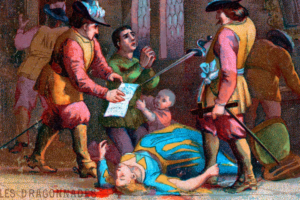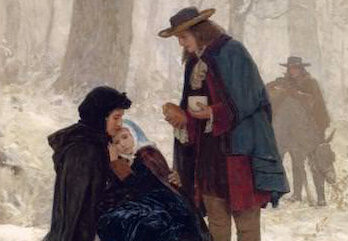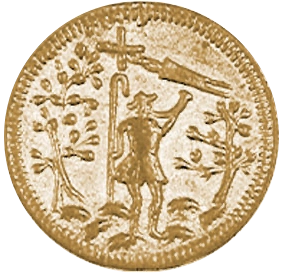D is for Dragonnade – Persuasion by any means
A contribution to the #AtoZchallenge 2024
A Huguenot farmer experiences the full force of a dragonnade
The year was 1681. King Louis XIV decided to put an end to ‘Calvin’s heresy’ by striking a great blow. On the advice of his entourage, regiments of dragoons were sent to the Poitou province to persuade the lost subjects to abjure their faith, in principle by persuasion but in reality by any means they saw fit.
The procedure was simple: armed with a billet, the dragoons, both men and horses, presented themselves to parishioners known to hold ‘pernicious’ ideas, who had often been denounced by the priest himself. The landlord then had to accommodate both riders and mounts, feed them and pay them a certain amount of money each day.
The soldiers brought heavy verbal and physical terror to the villages, which ceased as soon as the people abjured. The results were immediate: in a few weeks tens of thousands renounced their Protestant faith. The more the victim resisted, the more severe the persecution became.
Abraham Papot, a well-to-do farmer from Vaumoreau in the parish of Vouillé, had this sad experience. Here he tells of his misfortunes, which he had recorded by a notary.
Abraham Papot recounts his woes
| I, Abraham Papot, then living in Vaumoreau in the parish of Vouillé [near Niort, Poitiers], had the officer Monsieur Capy and his servants, with four horses, billeted at my house for 24 days from 7th till the 31st of August 1681. I had to pay him three crowns a day and keep all his party well-fed, which amounted to the sum of 135 livres. On top of that, Mr. Alexander, who said he was a Protestant captain, was sent to me with his servant and two horses. When they arrived at our house at about two o’clock in the night, one of them grabbed me by the throat and said to me, ‘By God, you will no longer go to the culte, you will come to mass tomorrow morning, dead or alive.’ So I was forced to comply, or I would have left my poor wife and the rest of my family to feed and pay them. From November 1st 1681, Monsieur de Vaumoreau, vicar of the priory of Mougon, brought four horsemen with two servants, whom I had to feed well and pay the sum of 21 livres. When those four horsemen and their servants came into our house, they put wood on the fire and lit it. Then they took our daughter Elizabeth and threw her into the raging fire, saying: ‘You will burn, you Calvinist wench.’ The poor girl resolved to endure death rather than obey, when they said: ‘By God, you will come to mass, you bastard!’ And when they saw she wouldn’t come out of the fire, one of them took her by an arm, saying: ‘God’s death! You’d let yourself be burned. Get out of there!’ They cruelly mistreated my good wife, who was 65 years old, tearing off her clothes and dragging her through the house. They opened a large chest, intending to lock her and her daughter-in-law in it. They struck her in the ribs with the butt of their musket, shouting, ‘By God, you will come to mass, you Calvinist wench.’ She refused, saying she would rather die. Then the poor woman fainted and when her daughter-in-law saw her dear, good-natured mother-in-law in such a state, she exclaimed, ‘My mother is dead.’ One of the dragoons ordered the other to bring vinegar and said, ‘Rub her nose and temples.’ Just then some neighbour women, hearing the daughter-in-law’s cry, ran up and said, ‘My God, what is this? We know what soldiers are, but they don’t injure people.’ And they said to each other, ‘This woman is dead.’ At that moment, the vicar of Mougon, Sr. de Vaumoreau, arrived and asked the dragoon, ‘Don’t they want to go to mass?’ He answered, ‘No,’ and was told, ‘Climb up on the house and pull down all the thatch.’ And the two soldiers, who had been fed and paid as I mentioned, said, ‘Let’s get our horses ready and go.’ And I, Abraham Papot, 67 years old, having brought up seven children – four of whom were married, whereby they had deprived me of much of what little God had given me – had continually had burdens in my life. Seven times I worked as a collector to help raise funds for his Majesty, suffering great losses. But God gave me and our parishioners the grace to give a true account of our action. And to my great harm, making a beggar of me, I had to feed and pay the soldiers as stated above. First, as recorded in the year 1680, I paid the sum of ninety-three livres. Then, as recorded in the year 1682, I paid the sum of one hundred and eighty-six livres. Further, in the year 1683, they charged me an intolerable sum beyond my means, as any reasonable person could see, which would totally ruin me as well as the whole parish of 278 households. They assigned me a sixth of the parish, which amounted to three hundred and sixty-eight livres. The records of the three years above were verified in the élection of Niort each year and signed by the clerk Bastard. And in the year 1684, in the parish of Vouillé, I was again charged the sum of 368 livres. And in the year 1685, in the parish of Fressigne, I was also charged the sum of 363 livres. Further, in the houses of Pelinere, the Lord Prior of Fressigne had two hundred bushels of wheat and straw removed and after the horsemen were sent away, he had that wheat taken and carted to his house. From INFO-BIBLE; from Thomas MARCHÉ |
Abraham Papot was born in 1615. He worked as a merchant, farm labourer and tailor. After the attack by the dragoons, his life was misery, but neither he nor his family renounced their faith. He died in 1691, his wife in 1693.
In the book ‘Greet Suzon for me’, Gédéon and his father visit Abraham Papot and hear about the dragonnade in his house. The book, which is due to be published in 2025, describes the Huguenot family’s perilous escape from France to Jersey.
Here are all the A-Z posts: A B C D E F G H I J K L M N O P Q R S T U V W X Y Z








Fascinating to read the first person account of a dragonnade – the cruelty is very sad
That’s horrible. So sad that things like this happened (and still do in many cases and to many different people).